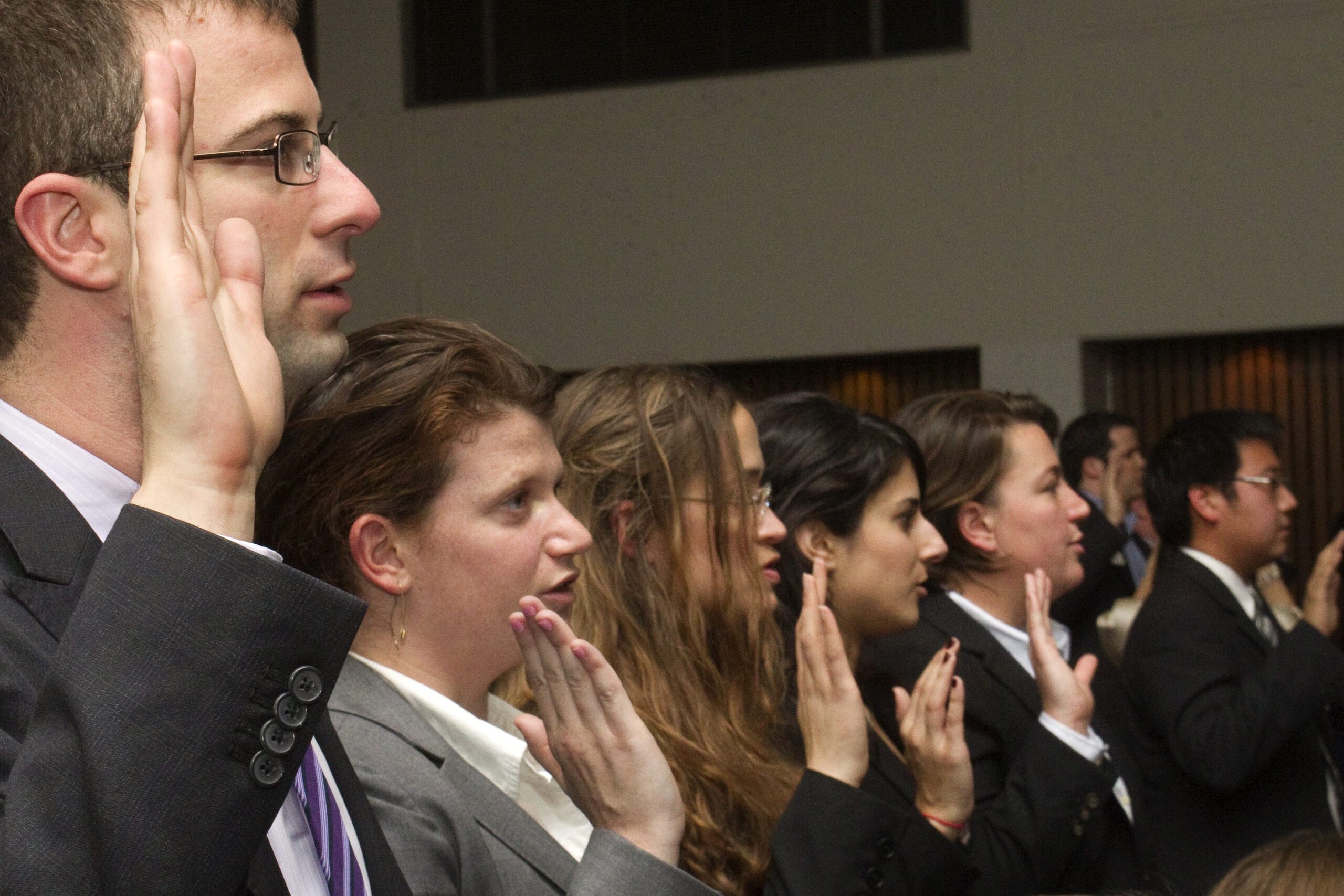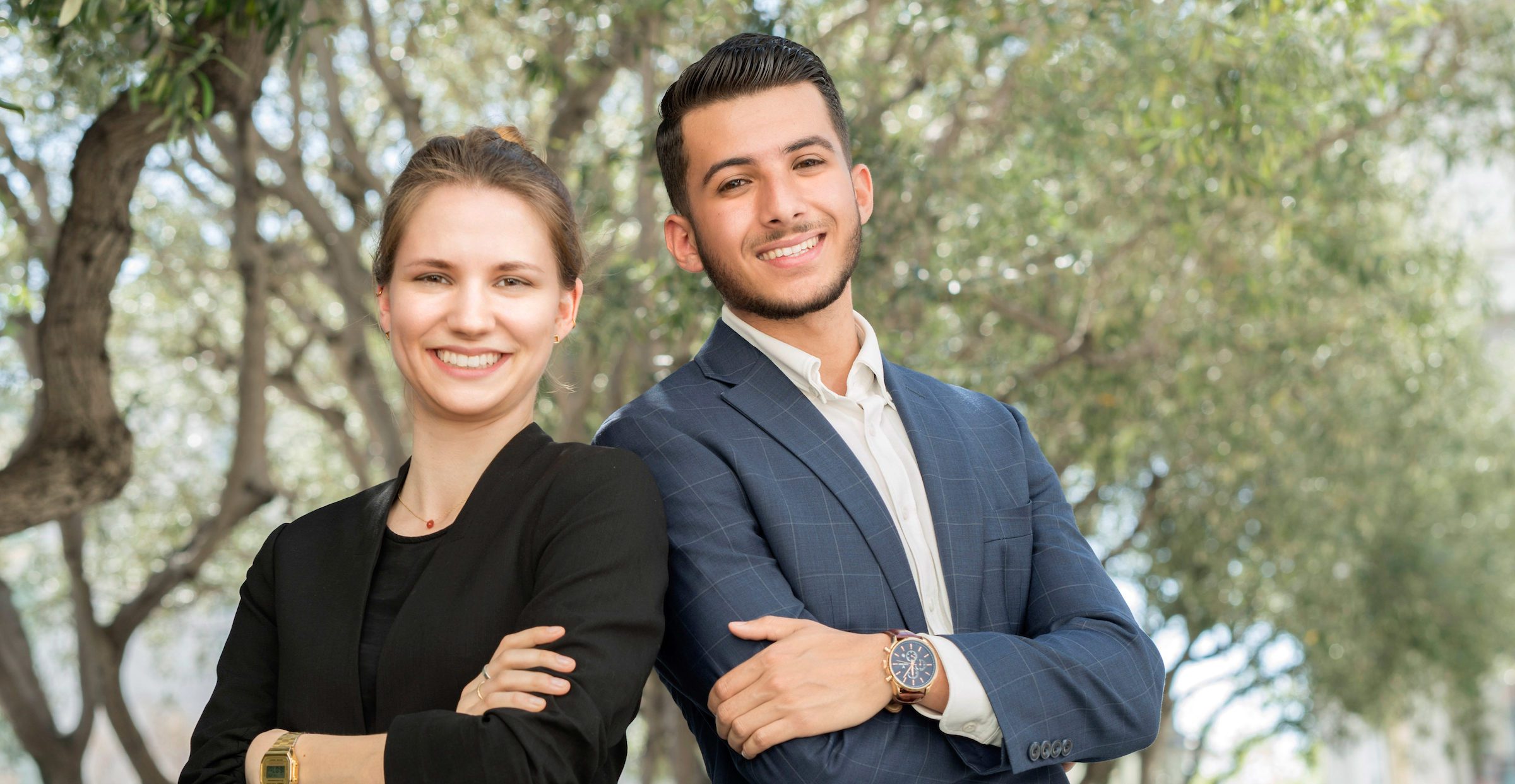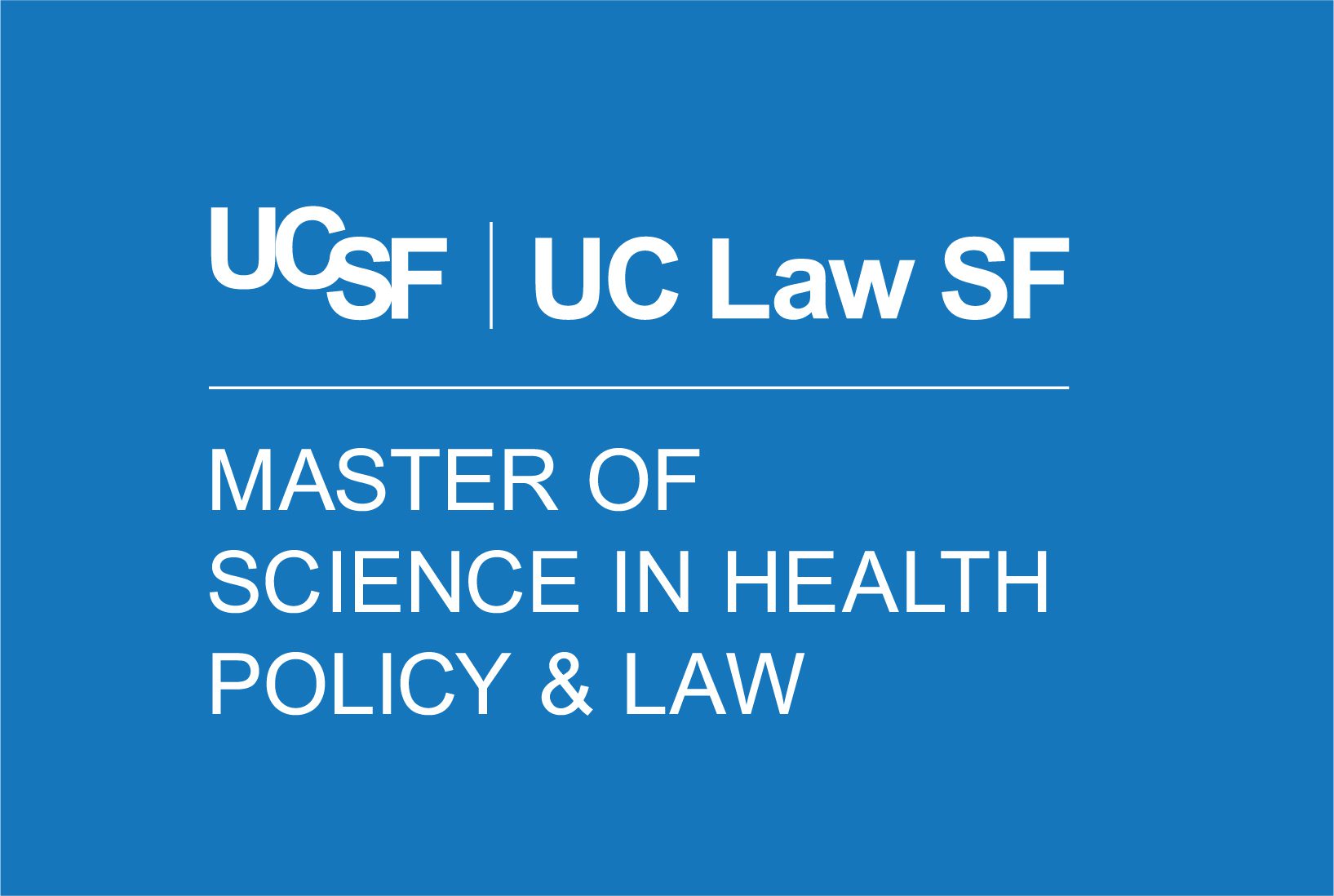How to Apply
We are now accepting applications for Fall 2026. The deadline to apply is April 15, 2026.
If you have questions about the admissions process, please visit our Frequently Asked Questions page, call the Admissions Office at (415) 565-4623, or send an email to admissions@uclawsf.edu. If you encounter any technical difficulties with the application process, contact LSAC directly at (215) 968-1393.
Applicants can check their application status here. The Admissions Office will notify applicants if they are missing any documents, as well as when the application and CAS report have been received.
- Candidates must have earned a bachelor’s degree (or its foreign equivalent) from an accredited institution of higher education prior to beginning the JD program.
- LSAT: Official scores must be from LSAT examinations administered between June 2020 and April 2026. The highest score will be used in determining the Admission Committee’s decision.
- Candidates must register with the Law School Admission Council’s Credential Assembly Service (CAS).
- Candidates who have been academically disqualified at any law school are ineligible for admission to UC Law SF.
- Completed Application submitted via LSAC
- Law School Admission Test (LSAT) and/or the Graduate Record Examination (GRE) score from a test administered between June 2020 and April 2026.
- Submit all undergraduate and graduate transcripts to LSAC.
- Two Letters of Recommendation sent directly from the writer to LSAC and assigned to UC Law SF College of the Law. The Admissions Office prefers letters from writers who can speak to the applicant’s academic abilities, but letters from professional supervisors and mentors will also be considered.
- Personal Statement – There is no limit as to the length, but the personal statement will be evaluated for clarity, content, and skill of presentation.
- Current Resume
- LEOP Application (Optional – see below)
- Explanations are required for any affirmative responses to the Character and Fitness questions on the application.
We look forward to reviewing your application.
UC Law SF requires all applicants to take a standardized test for admission—either the Law School Admission Test (LSAT), which is the preferred test, or the Graduate Record Examination (GRE).
- Applicants who take both the LSAT and the GRE must submit their LSAT scores, but can choose whether to submit their GRE scores.
- Applicants applying with only GRE scores are still required to use the LSAC Credential Assembly Service (CAS) for the submission of their application materials.
LSAT: Official scores must be from LSAT examinations administered between June 2020 and April 2026.
GRE: Official scores must be from GRE examinations administered within five years of the date you submit your application to UC Law SF. For example, scores for a test taken on September 17, 2025, are reportable through September 16, 2030. Applicants who have taken the GRE can log into their ETS account and select UC Law SF College of the Law as a recipient of GRE results using the school code: 4342.
UC Law SF created the Legal Education Opportunity Program (LEOP) in 1969 to make an outstanding legal education accessible to those who come from disadvantaged economic and educational backgrounds. Students planning to apply to UC Law SF through LEOP should review the LEOP Supplement in the Attachments section of the application. LEOP applicants must answer all questions on the Supplement. There is no required word count, but responses of 50–250 words are typically sufficient. LEOP applicants are also strongly encouraged to attach a separate LEOP statement describing the adversity they faced and its impact on their academic preparedness for law school. Diagnostic reports documenting disabilities and/or accommodations can be submitted as addenda.
- Describe the financial situation of your family from birth to college entry. Please include sources of income, income estimates, number of household wage earners, and number of dependents. Please describe any unusual expenses.
- Please describe the occupation(s) and the educational background(s) of the person(s) who raised you.
- Describe your early educational experiences through high school. Discuss the expectation level of and support for educational and career achievement in your family and community. What impact, if any, did it have on your education?
- Please list your source(s) of financial support in college by approximate percentage:
Family: ___ Employment: ___ Loans: ___ Grants/scholarships: ___ Other assistance:___ - Describe any paid or unpaid test preparation, academic support, or tutorial services you have used since elementary school.
- Identify and describe the community(ies) in which you resided from birth to age of college entry. Describe any bias you faced as a member of such community(ies) and explain what impact, if any, it had on your academic performance.
- Are you an immigrant or the child of immigrant parents? If yes, please include the country of origin, year of arrival in the U.S., and the reason for immigrating.
- If English is not your first language, how old were you when you first learned English? Was English the primary language spoken in your home?
- Have you had any learning or physical disability that may have adversely affected your academic performance? Please indicate what accommodations, if any, you were provided in high school and college. If possible, please include supporting documentation of your disability and/or accommodations.
LEOP applicants are strongly encouraged to submit an additional personal statement identifying and describing in detail the challenges and obstacles they have faced and the impact these challenges have had on their academic preparation. Applicants should include specific information on what they have done to meet and/or overcome these challenges.
To learn more about LEOP, email LEOP@uclawsf.edu or join a LEOP-focused information session.
UC Law SF offers 3+3 programs in collaboration with Spelman College and Cal Poly San Luis Obispo. Under the 3+3 programs, students can earn their undergraduate degree from Spelman College or Cal Poly SLO and their juris doctor degree from UC Law SF in six years instead of seven, saving time and money. Participating students will spend three years at their undergraduate institution, completing general education and major coursework requirements. In the fourth year, participants will begin their legal studies at UC Law SF. Credits earned in the fourth year will satisfy degree requirements at their undergraduate institution while also counting toward their law degree. If you are a Spelman College or Cal Poly SLO student and are interested in learning more about the 3+3, please reach out to your pre-law advisor, or email us at admissions@uclawsf.edu.
- Over 80% of our student body has received merit scholarships or need-based grants to help defray the cost of law school.
- No separate application is required for merit scholarship consideration. Admitted students who have been offered merit scholarships are not eligible for need-based grants.
- Admitted students who have been invited to apply for need-based grants should submit the UC Law SF Financial Aid Supplement as soon as possible.
- Students may borrow funds through Federal Direct Unsubsidized Stafford Loans, Federal Direct Graduate PLUS Loans, and/or alternative credit-based loans to help cover the cost of attendance. To apply for Federal student loans, admitted students should complete the UC Law SF Financial Aid Supplement and the Free Application for Federal Student Aid (FAFSA). The UC Law SF code is G03947.
Applicants can check their status here. The Admissions Office will notify applicants if they are missing any documents, as well as when the application and CAS report have been received.
The Admissions Office will begin reviewing files in October. Decision notifications are sent out beginning in December and will continue to be sent through June. Please keep the Admissions Office updated of any changes to your phone number, email address, and mailing address.
Please add admissions@uclawsf.edu to your “Trusted” email list so that emails from the Admissions Office will not get buried in your spam folder.
The University of California College of the Law, San Francisco prohibits discrimination against any person on the basis of the following protected categories: age, ancestry, childbirth or related medical condition, citizenship, color, creed, ethnicity, gender, gender expression, gender identity, gender transition status, genetic information (including family medical history), marital status, military or veteran status, medical condition (e.g., cancer-related or genetic characteristics), national origin, disability, pregnancy, race, religion, sex, sexual orientation, sex- or gender-stereotyping, or any combination of these or related factors. The College’s full notice of non-discrimination is available here. Concerns and questions regarding sex discrimination may be reported to the Title IX Coordinator.

Transfer Applicants
UC Law SF welcomes applications from students attending other ABA accredited law schools. Transfer students are quickly integrated into the fabric of the law school community and can participate in on-campus interviewing, pursue a concentration, write on a journal, and take advantage of the myriad opportunities for professional growth in the Bay Area legal community.
Learn More
Visiting Applicants
JD Students attending other ABA law schools can spend one to two semesters at UC Law SF as Visiting Students on a space-available basis. Visiting applicants may apply for fall and/or spring terms during their 2L or 3L year.
Learn More
Admission to the Bar
In addition to a bar examination, there are character, fitness, and other qualifications for admission to the bar in every U.S. jurisdiction. Applicants are encouraged to determine the requirements for any jurisdiction in which they intend to seek admission by contacting the jurisdiction. Addresses for all relevant agencies are available through the National Conference of Bar Examiners.
Learn More
LL.M. in U.S. Legal Studies
If you are an attorney licensed outside of the U.S., or have completed a first degree in law outside of the U.S., UC Law SF invites you to apply for a one-year LL.M. degree in U.S. Legal Studies. Applications are reviewed on a rolling basis from September 1 through June 30. The priority deadline is March 1.
Learn More
Master of Studies in Law (MSL)
The Master of Studies in Law (MSL) is a one-year degree program for professionals seeking to equip themselves with a sophisticated understanding of legal reasoning and doctrine. Applications are reviewed on a rolling basis starting October 1. The priority deadline is April 15.
Learn More
Masters of Science, Health Policy & Law (HPL)
The Masters of Science, Health Policy & Law (HPL) is a fully online program leading to a jointly conferred degree from UC Law SF and the University of California San Francisco. The program provides students with the tools and knowledge to navigate legal reform and policy impact within the health care system.
Learn More